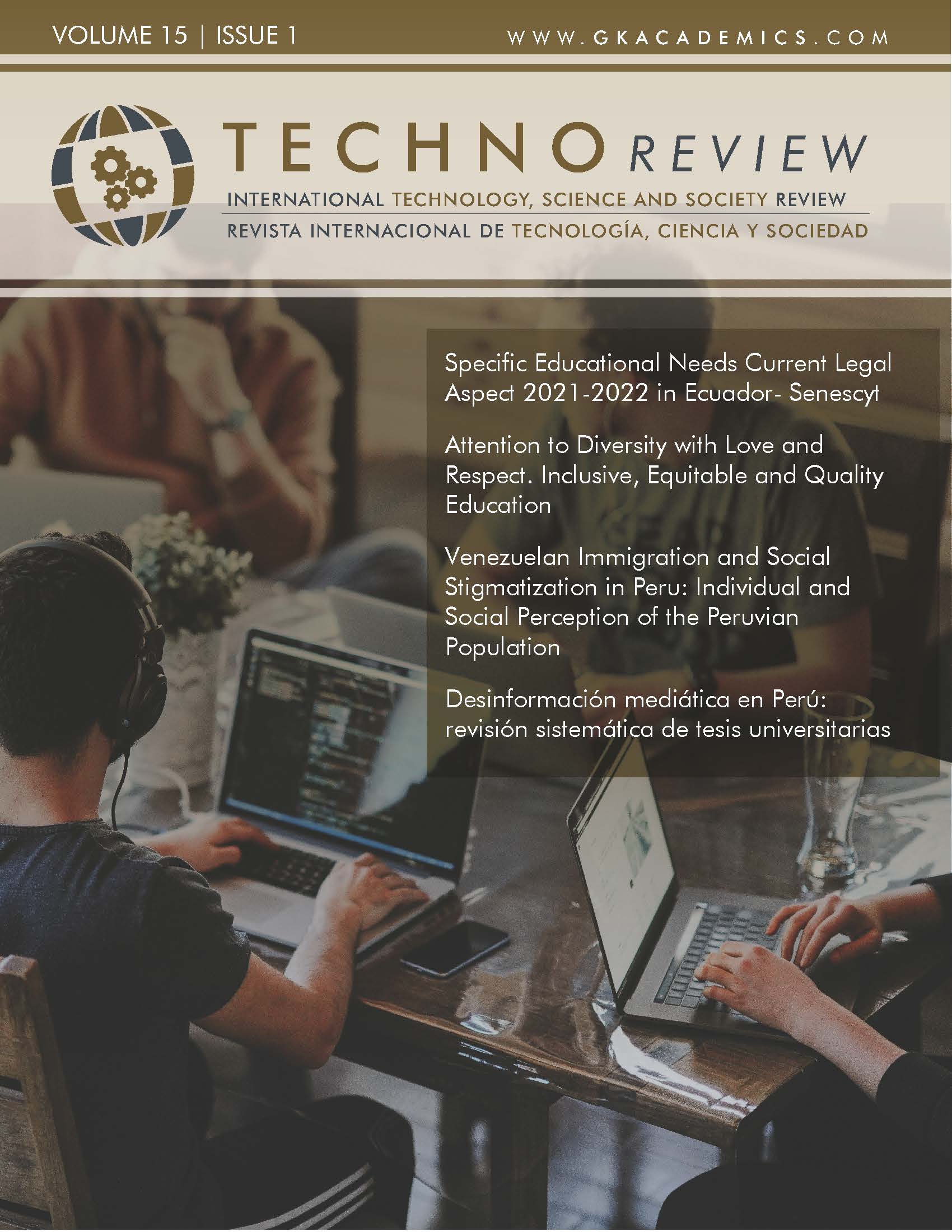Positive mental health and occupational burnout in the tourism sector in Peru
DOI:
https://doi.org/10.37467/revtechno.v15.5099Keywords:
Mental health, Burnout, Tourism, PeruAbstract
The COVID-19 crisis and the political conflicts in Peru affected tourism activity, generating psychosocial risks. The objective of the study was to establish the relationship between positive mental health and occupational burnout in employees of the tourism sector in Junín. The approach was quantitative, basic type, correlational level, non-experimental design, cross-sectional descriptive correlational. The sample consisted of 384 collaborators, and the Positive Mental Health Scale and the Occupational Burnout Scale were applied. The results showed an inverse (Kendall's Tau b = -.738) and significant (p-value < .00) correlation between both variables. It is concluded that the better mental health, the less occupational burnout.
References
Arroyave, C. O. M., Arango, D. C., Restrepo-Ochoa, D. A., & Calvo, A. C. (2022). Positive mental health: Between well-being and capacity development. Revista CES Psicologia, 15(2), 151-168. https://doi.org/10.21615/cesp.5275
Baum, T. (2018). Sustainable human resource management as a driver in tourism policy and planning: A serious sin of omission? Journal of Sustainable Tourism, 26(6), 873-889. https://doi.org/10.1080/09669582.2017.1423318
Chavarría Islas, R. A., Colunga Gutiérrez, F. J., Loria Castellanos, J., & Peláez Méndez, K. (2017). Burnout syndrome in teaching physicians at a 2nd level hospital in Mexico. Educación Médica, 18(4), 254-261. https://doi.org/10.1016/j.edumed.2016.09.001
Cheng, T.-M., Hong, C.Y., & Zhong, Z.F. (2021). Tourism employees' fear of COVID-19 and its effect on work outcomes: The role of organizational support. Current Issues in Tourism, 25(2), 319-337. https://doi.org/10.1080/13683500.2021.1978952
Claudio-Quiroga, G., Gil-Alana, L. A., Gil-Lopez, A., & Babinger, F. (2022). A gender approach to the impact of COVID-19 on tourism employment. Journal of Sustainable Tourism, 23(8), 1818-1830. https://doi.org/10.1080/09669582.2022.2068021
Gómez-Acosta, A., Vinaccia Alpi, S., & Sierra-Barón, W. (2020). Psychometric properties of the positive mental health scale in Colombian youth: an exploratory study. CES Psicología, 13(2), 102-112. https://doi.org/10.21615/cesp.13.2.7
He, Z., & Hao, X. (2022). Emotional labor and employee well-being in cross-cultural contexts: A Disney frontline staff's autoethnography. Tourism Management, 91, 104518. https://doi.org/10.1016/j.tourman.2022.104518.
Joseph Sirgy, M. (2019). Promoting quality-of-life and well-being research in hospitality and tourism. Journal of Travel & Tourism Marketing, 36(1), 1-13. https://doi.org/10.1080/10548408.2018.1526757
Llosa, J. A., Menéndez-Espina, S., Agulló-Tomás, E., & Rodríguez-Suárez, J. (2018). Job uncertainty and mental health: A meta-analytic review of the consequences of precarious work on mental disorders. Annals of Psychology, 34(2), 211-223. https://revistas.um.es/analesps/article/view/analesps.34.2.281651
Lluch-Canut, M.T. (2002). Empirical evaluation of a conceptual model of positive mental health. Salud Mental, 25(4), 42-55. http://www.revistasaludmental.mx/index.php/salud_mental/article/view/914
Moraes Neves, L. T., & Graciano, P. F. (2021). Covid-19 Pandemic: Challenges Social Tourism. Rosa Dos Ventos-Turismo e Hospitalidade, 13(4). https://www.webofscience.com/wos/woscc/full-record/WOS:000737424400005
Palma, A., & Ansoleaga, E. (2022). Emotional demands, workplace violence and mental health by gender in Chilean public hospital workers. Psicoperspectivas, 21(2). https://doi.org/10.5027/psicoperspectivas-vol21-issue2-fulltext-2258
Paredes-Pérez, M., Ramírez-Arellano, M. A., Cárdenas-Tapia, V. R. & Alania-Contreras, R. (2023). Attitude towards indebtedness and compulsive buying behavior, of settlers in Peru. Revista De Ciencias Sociales, 29(7), 174-186. https://doi.org/10.31876/rcs.v29i.40456
Ross, G. F. (2006). Tourism Industry Employee Workstress-A Present and Future Crisis. Journal of Travel & Tourism Marketing, 19(2-3), 133-147. https://doi.org/10.1300/J073v19n02_11
Ruiz-Frutos, C., & Gómez-Salgado, J. (2021). Effects of the COVID-19 pandemic on the mental health of the working population. Archivos de Prevención de Riesgos Laborales, 24(1), 6-11. https://archivosdeprevencion.eu/index.php/aprl/article/view/110. https://archivosdeprevencion.eu/index.php/aprl/article/view/110
Sönmez, S., Apostolopoulos, Y., Lemke, M. K., & Hsieh, Y.-C. (Jerrie). (2020). Understanding the effects of COVID-19 on the health and safety of immigrant hospitality workers in the United States. Tourism Management Perspectives, 35, 100717. https://doi.org/10.1016/j.tmp.2020.100717. https://doi.org/10.1016/j.tmp.2020.100717
Xiong, W., Huang, M., Okumus, B., Leung, X. Y., Cai, X., & Fan, F. (2023). How emotional labor affect hotel employees' mental health: A longitudinal study. Tourism Management, 94, 104631. https://doi.org/10.1016/j.tourman.2022.104631.
Xu, S. T., Cao, Z. C., & Huo, Y. (2020). Antecedents and outcomes of emotional labour in hospitality and tourism: A meta-analysis. Tourism Management, 79, 104099. https://doi.org/10.1016/j.tourman.2020.104099.
Uribe Prado, J. F., López Flores, P. R., Galicia, C. P., & Saisó, A. G. (2014). Occupational burnout syndrome (burnout) and its relationship with health and psychosocial risk in public officials who impart justice in Mexico City. Acta de Investigación Psicológica, 4(2), 1554-1571. https://doi.org/10.1016/S2007-4719(14)70393-X
Vidotti, V., Martins, J. T., Galdino, M. J. Q., Ribeiro, R. P., Robazzi, M. L. do C. C., Vidotti, V., Martins, J. T., Galdino, M. J. Q., Ribeiro, R. P., & Robazzi, M. L. do C. C. (2019). Burnout syndrome, job stress and quality of life in nursing workers. Global Nursing, 18(55), 344-376. https://doi.org/10.6018/eglobal.18.3.325961.
Downloads
Published
How to Cite
Issue
Section
License
Those authors who publish in this journal accept the following terms:
- Authors will keep the moral right of the work and they will transfer the commercial rights.
- After 1 year from publication, the work shall thereafter be open access online on our website, but will retain copyright.
- In the event that the authors wish to assign an Creative Commons (CC) license, they may request it by writing to publishing@eagora.org







